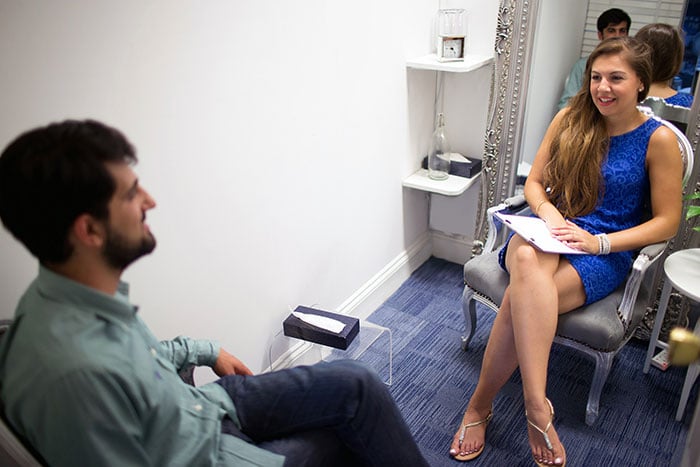Being a CBT therapist in London – Interview with Tara McCloskey
3rd March 2024Dr. Becky Spelman discusses what to do if there are problems in the relationship with your therapist. When to stick out the relationship, when to call it a day and what is the best way to confront your therapist.
I’ve been asked by somebody to make a video on the topic of addressing conflict or dissatisfaction with your therapist. Somebody has asked me, “What do I do if I don’t like my therapist or they’re annoying the hell out of me or they’re frustrating me or it’s just not working?”
How to solve therapist issues
The first step would be to always address this with your therapist. Do not leave that therapeutic relationship until you’ve brought up this conversation with your therapist and provide any feedback about whatever annoyances, frustrations, or dissatisfaction that you have with that therapist at the earliest opportunity even if it’s just a bit of a minor annoyance that happened in the last session or something that has frustrated you. We’re not perfect as therapists. We do get things wrong. I’ve had lots of my own personal therapy as well, I’ve been in the seat of being a client many times, and I can understand where and why you might get a bit frustrated with your therapist. Sometimes it’s simple things, like, your therapist ending the session too early or forgetting things, not hearing you properly. Are they actually having hearing problems or misinterpreting what you’re saying or giving advice that you were a bit disappointed where it was wasn’t really the guidance that you were looking for.
Whatever it might be, if your therapist has caused any negative emotion in you, be it annoyance, frustration, disappointment or even anger, I would advise you to say this on the very next session with your therapist, “Can I give you some feedback from the last session about the way I was feeling in our session?” “Well, you frustrated me when this happened…” “I felt a bit annoyed when this happened…” A simple way of doing it is just to label that emotion that your therapist’s behaviour caused you to feel and provide them with that feedback.
Listen to your therapist’s response
Your therapist’s response is going to be really key to what’s going to happen next in the therapeutic relationship and help you decide whether you can hold onto that therapeutic relationship or not. Do not end the therapeutic relationship without going into the situation and confronting your therapist. It’s also a very good way of practising confronting conflict and dealing with conflict particularly if you’re somebody who avoids conflict in your everyday life because the therapeutic relationship often reflects what’s happening in your everyday life and how you deal with situations in your everyday life. I meet a lot of people who are very anxious about conflict, so getting them to practise that in their sessions and practising having difficult conversations with their therapist is a really important thing for people to try.
Not only is this going to inform you as to whether you can continue with that therapeutic relationship and certainly if you feel understood and heard, and your therapist accommodates you and takes your feelings into consideration, and put themselves in your shoes, and they make changes accordingly, then perhaps you can continue. But this is also another way of being able to overcome some difficulties that you might experience with conflict and communicating with people in your everyday life outside of your therapy sessions.
Get the therapeutic relationship right
It is really important to get that therapeutic relationship match right and it’s not always possible to get that right every time or the first time around. But I always say to people don’t end that therapeutic relationship too soon, and don’t avoid conflict with your therapist. Don’t walk on eggshells with your therapist. If you’ve got a good therapist, then your therapist should be able to handle any of these difficult conversations.
So, challenge your therapist in that way and test out the therapeutic relationship in that way and see what happens. Stick in there and stick it out through the hard times as well as the good because therapy is not just all about making you feel good, and actually, the best type of therapy is therapy where you can actually do a bit of a dance with your therapist where there are some difficult times and challenges in that therapeutic relationship. Remember, both you and your therapist are only human and it’s not about going to this warm, cosy environment where your therapist always makes you feel great. It’s about actually getting to know you, getting to know yourself, and how you deal with conflict and interpersonal issues as well as being able to get help from your therapist as well. I’ve certainly never had a therapeutic relationship where I’ve been the client where there hasn’t been any difficulty and one of the biggest learning points and the best experiences that I’ve had is surfing through those difficult times and being able to have those difficult conversations with my therapist.
So, I wish you all the best. If you’ve got other questions, feel free to keep sending them through and I’d be happy to do more videos.
Who can I speak to further about the issues in this article?
For help with the issues discussed in this article speak to one of our therapists here at Private Therapy Clinic.












